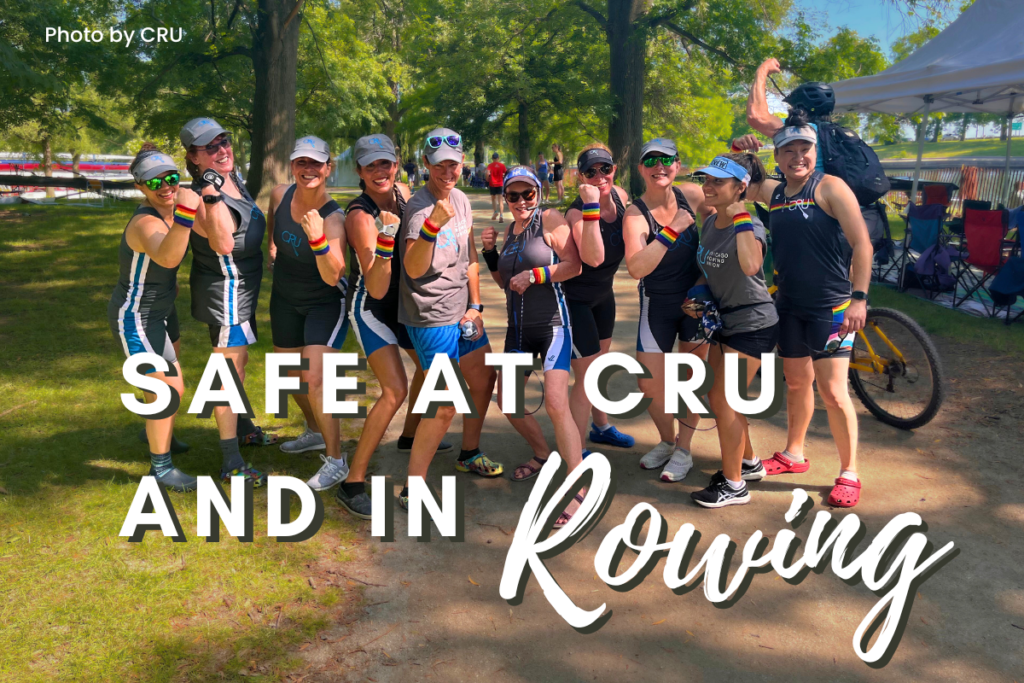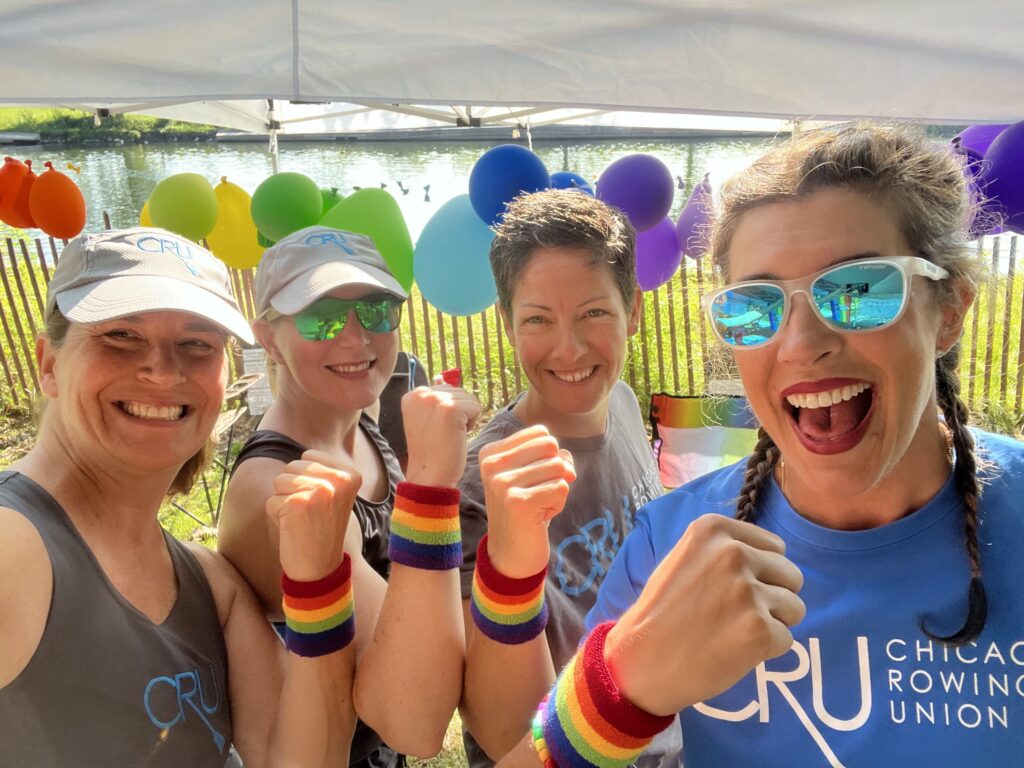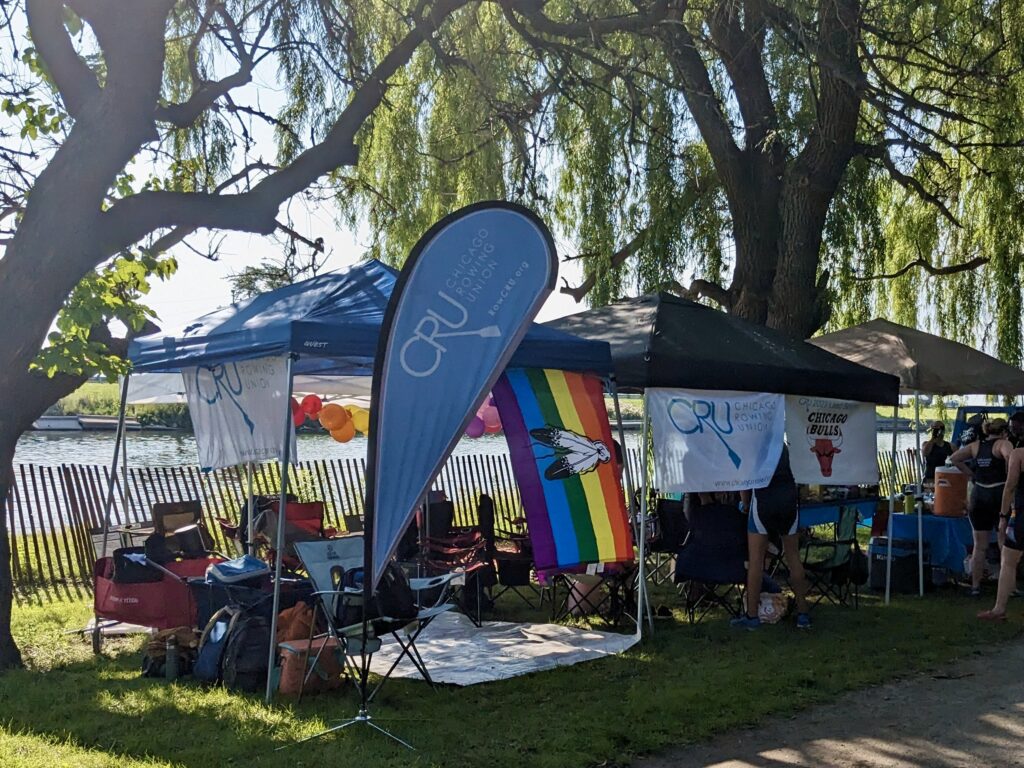
Safe at CRU and in Rowing
In conversation with Simone Azure, President of Chicago Rowing Union (CRU), the word “safe” comes up a lot. As one of only two LGBTQ+ inclusive clubs in the United States and a handful around the world, ensuring that all rowers feel accepted and comfortable is key.
CRU was awarded a NK Sports Grant in late 2023. What they purchased with the $1,000 credit was perhaps slightly unexpected, but consistent with the history and ethos of the club. First founded in 2005, the club’s original name was Qrew Chicago. It was started by a small group of rowers who wanted to compete in the 2008 Gay Games being held in Chicago. At the time there was no place for them to row where they felt safe. In 2009 the club’s name was changed to Chicago Rowing Union. The club grew at the Dammrich Rowing Center in Skokie IL. Simone used to row at a nearby club. She was recruited to a Learn to Row at CRU in 2012 during a street festival in a gay village in Chicago where she lived with her wife. Until then she had been unaware of the club’s existence.
The COVID pandemic hit the club hard. When rowing returned, they were down to about 4 or 5 members, but a strong and committed group. Simone became President in 2020. Their membership now is about 75 rowers. As part of the inclusive philosophy of the club, dues are kept as low as possible. With the club’s rapid growth, boats were purchased, typically used boats that needed care. CRU already had CoxBoxes. Using the Grant, Simone decided to purchase CoxBox batteries (which are interchangeable with the Blue Ocean Megaphone), headsets, mouth pieces, speakers and speaker wire repair kits. Maintaining their equipment to stretch their budget is a priority over having the latest and greatest. Besides, the members don’t come to have the best boats (there are other clubs much better equipped). They come for the community.


Safe Rowing
When we think about safety in rowing, physical risks are what first come to mind. They are very real and an important issue, for example in university rowing clubs. Safe rowing also refers to a place where an athlete is not going to hear slurs or face prejudice, where they feel welcomed. A safe community and environment are not just important for LGBTQ+ rowers, but also for the entire diverse rowing community. Elite, high-performance athletes are not immune to these safety concerns – think of the recent scandals in gymnastics and other sports.
Simone is confident that CRU has created the safe community for LGBTQ+ rowers and their allies. You definitely do not need to be gay to row, coach or volunteer there. Simone wants CRU to be a place not only where people feel loved and not judged, but also a place where people are open to asking questions and learning. Some new rowers do not initially realize that CRU is inclusive, although the website clearly states this. They stay because they like it.
There is always more to learn. Simone is learning about trans-gender athletes. The club has welcomed a 6’7” non-binary athlete from Palestine. Sorting the right crew for them has been a learning exercise for the club. Should they wish to race there could be further challenges to surmount – Simone does not believe that there is clarity from USRowing on gender categories. CRU has decided to put them in whichever boat makes sense at a regatta and face any consequences or complications.


Creating Safe Rowing
Many rowing organizations have safety guidelines dealing with physical risks such as capsizing, cold weather or heat stress. There are significantly fewer guidelines on creating an inclusive culture and ensuring that rowing is a safe sport for all.
Rowing Canada Aviron is considered to be leading other sport agencies in Canada in setting policies and processes to “to protect the health, safety and physical and mental well-being of every Individual that is involved in the Canadian rowing community”. Their Safe Sport Policy Manual was published in 2021 with the intention to prevent all forms of misconduct and maltreatment. All provincial rowing organizations and every club in Canada are required to learn about, review and adopt the Manual. At 54 pages it covers not just a code of conduct and ethics but also considers how to investigate and deal with complaints, appeals process and even a social media policy.
Like most national federations, USRowing has also been paying attention to the topic, including the hiring of a Diversity, Equity, and Inclusion Associate. LGBTQ+ issues have been covered on their website, in webinars and as Convention workshops. David DeWinter of RowHero provided a succinct summary of one at the 2021 Convention:
Boathouses have a significant opportunity to be a place where every rower and coach can feel accepted and loved by their community. However, it takes strong, intentional leaders to create that kind of environment. Take ownership of the language you use and don’t use, lead your teams in conversations about acceptance, and help your rowers feel heard.
Flying the gay flag at the boathouse can make the boathouse feel like a safe place for gay people. Straight people don’t worry about being welcome somewhere, but for some gay people, those signs of acceptance are very meaningful.
If you hear discriminatory language at your boathouse (e.g. “that’s so gay,” “you row like a girl”), then it’s on you to correct and hold your rowers and coaches accountable. Take the power away from those words being used negatively.
British Rowing provides an extensive discussion of the need to build a safe rowing culture. While their focus is on mitigating physical hazards and risks to prevent accidents, the approach very much applies to the creation of a safe rowing culture at any club. This is built on individual and collective beliefs, values, attitudes, perceptions, competencies and patterns of behaviour. It takes time to help people understand how their behaviours influence the experience and safety of others. Sometimes rules or policies are required. “Eventually, imposed behaviours become learned behaviours, and learned behaviours will become natural or instinctive behaviours” says the British Rowing manual.
The members of CRU take their safe rowing culture with them when they travel to regattas or other events. They evaluate destinations. For example in 2022 they did not compete in the USRowing Masters National Championships at Sarasota FL in part because of the “don’t say gay” bill. At a regatta in a rural area one of their members, a Black woman, was concerned for her safety and the club rallied around her throughout the event. CRU flies LGBTQ+ flags at regattas and has made arches of multi-colored balloons. Members might wear rainbow arm bands. The response is usually one of curiosity, conversations and acceptance from the regatta attendees. By saying it loud and proud, Simone and the Chicago Rowing Union are working to make rowing safe for all.